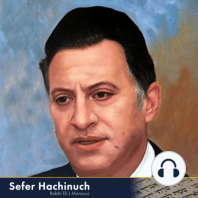20 min listen
Misva #227: Swearing Falsely
FromSefer Hachinuch
ratings:
Length:
20 minutes
Released:
Jun 29, 2022
Format:
Podcast episode
Description
The Torah commands in Parashat Kedoshim (Vayikra 19:12), “Ve’lo Tishabe’u Bi’Shmi La’shaker” – that it is forbidden to make a false oath. The Sages understood this verse as referring to a “Shebu’at Bitui” – an oath about something that one did or did not do in the past, or about something that one will do or not do in the future. The four classic examples of this violation are: 1) if one swore that he ate a particular food at a particular time, and he did not; 2) if one swore that he did not eat a particular food at a particular time, and he did; 3) if one swore that he will eat a particular food at a particular time, and he does not; 4) if one swore that he will not eat a particular food at a particular time, and he does. A “Shebu’at Bitui” does not take effect with regard to something which the Torah commanded. For example, if a person swears that he will perform a certain Misva, and he fails to do so, then he is not in violation of making a false oath, because this oath was not binding. Even if he swore regarding the past, that he fulfilled a certain Misva, when he in fact had not, he has not violated this prohibition, as the oath has no validity. Similarly, if a person swears that he will cause harm to his fellow, this oath is not binding, as the Torah forbids intentionally causing one’s fellow harm. Interestingly, the Sefer Ha’hinuch writes that if one swore to cause himself harm, then the oath is binding. The commentators raise the question of how such an oath can take effect, given that the Torah forbids harming oneself. One answer given is that this prohibition is not presented explicitly in the Torah, and is rather inferred from a textual nuance, and only laws explicated in the Torah are excluded from the prohibition of false oaths. This prohibition only applies to oaths involving something over which a person has control. For example, if a person swears to his fellow that he will appeal to government officials on his behalf, and he has connections in the government, then the oath is binding. But if he swears to do something which is beyond his control, then the oath is not binding. This prohibition applies in all times, in all places, and to both males and females. The Sefer Ha’hinuch writes that one who transgresses this prohibition is liable to Malkut. According to some commentators, the Sefer Ha’hinuch refers here specifically to situations where one violates this prohibition by committing an action, namely, where one swears he will not do something and he does. In all other circumstances of violations of this prohibition, one transgresses either through inaction – by not doing what he swore to do – or through speech – by uttering a false oath about the past. Hence, he is not liable to Malkut, which are administered only for violations committed through an action. Others, however, understand that in the Sefer Ha’hinuch’s view, the prohibition against false oaths marks an exception to the rule, due to its unique severity, and one is liable to Malkut for violating this command even without committing an action. One who violates this prohibition mistakenly brings a special sacrifice called a “Korban Oleh Ve’yored” (literally, “the ascending and descending sacrifice”). It is so named because the offering depends on the person’s financial status. One who can afford an animal brings an animal sacrifice; a disadvantaged person brings two birds; and an impoverished violator brings a flour offering.
Released:
Jun 29, 2022
Format:
Podcast episode
Titles in the series (100)
Misva #10: The Obligation to Eat Masa: Daily Sefer Hachinuch - Brought to you by itorah.com by Sefer Hachinuch
